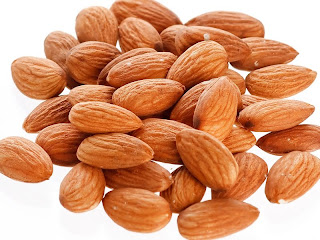Benefits of Almonds for Healthy Hair
By eating Almonds regularly can prevent your hair from hair loss and your hair be more straighten. Almonds contain some oils, trace minerals like manganese, potassium, calcium, iron, magnesium, zinc, and selenium that good for hair to prevent from branch, fall out and hair loss.The nuts also rich of vitamin B-complex groups such as riboflavin, niacin, thiamin, pantothenic acid, vitamin B-6, and folates. These vitamins functions as co-factors for enzymes during cellular substrate metabolism and protect the hair from damage.
The nuts are an excellent source of vitamin E; contain about 25 g per100 g (about 170% of RDA). Vitamin E is a powerful lipid soluble antioxidant, required for maintaining the integrity of cell membrane of mucus membranes and skin by protecting it from harmful oxygen free radicals.
Another health benefits of Almonds
Preventing from coronary heart disease
The nuts can prevent coronary heart disease because of Benefits Almonds have cholesterol-lowering effects. Recent research has shown that adding almonds to a number of different food turned out to donate a positive effect on heart health because the almonds can lowering the glycemic response to food and reduce oxidative damage from food. This is because almonds contains monounsaturated fats and are antioxidants. In addition, the almonds bark contain approximately 30 compounds of different antioxidants that provide many health benefits.Benefits of Almonds for Lowering Cholesterol
Almonds contained calcium that is very important for women. It can reduce cramps and stomach cramps just before menstruation. Benefit of calcium is very important to maintain bone health and prevent Osteoporosis. Studies have shown that walnuts can significantly reduce blood cholesterol.Nuts contain many polyunsaturated fatty acids (polyunsaturated fatty acids) that can keep blood vessels healthy and elastic. Nuts Almonds also have benefits that are not too different, where the decrease in cholesterol can you feel after about four weeks.
Benefits of Almonds to Increase blood flow
There are many studies that almonds contain vitamin E, unsaturated fats, magnesium, and antioxidants that help in increasing blood flow. Regularly eating almonds also helps your liver health.Benefits of Almonds for Streamline Body
International Journal of Obesity reveals eating a handful of almonds a day, along with a healthy diet, can help burn fat as much as 18 percent compared to those who only limits the daily menu.Benefits of Almonds for a natural moisturizer
The resulting pure almond oil is a natural moisturizer to keep the skin from drying out. Almond’s oil is naturally provides food and return the dead skin cells.Benefits of Almonds for heart disease
The study conducted by the Mayo Clinic, the common bean dish made friends chocolate is believed to lower LDL cholesterol levels by 12 percent.Almond nut allergy
Although not so common as other tree nut allergies like cashew, pistachio etc, may cause hypersensitivity cross-reactions in some people to food substances prepared using the nuts. The type and severity of symptoms may vary and may include vomiting, diarrhea, pain abdomen, swelling of lips, and throat leading to breathing difficulty, and chest congestion. Therefore, caution should be exercised in those with nut allergic syndrome while using food preparations that contain nut products.How to prevent Almond nut allergy?
To prevent allergies during eating almonds are advised to consume only a few seeds first and then wait up to 1 hour. If it does not happen you can eat nuts in accordance with existing nutritional doses.| Principle | Nutrient Value | Percentage of RDA |
|---|---|---|
| Energy | 575 Kcal | 29% |
| Carbohydrates | 21.67 g | 16% |
| Protein | 21.22 g | 38% |
| Total Fat | 49.42 g | 165% |
| Cholesterol | 0 mg | 0% |
| Dietary Fiber | 12.20 g | 30% |
| Vitamins | ||
| Folates | 50 µg | 12.5% |
| Niacin | 3.385 mg | 21% |
| Pantothenic acid | 0.47 mg | 9% |
| Pyridoxine | 0.143 mg | 11% |
| Riboflavin | 1.014 mg | 78% |
| Thiamin | 0.211 mg | 16% |
| Vitamin A | 1 IU | 0% |
| Vitamin C | 0 mg | 0% |
| Vitamin E | 26 mg | 173% |
| Electrolytes | ||
| Sodium | 1 mg | 0% |
| Potassium | 705 mg | 15% |
| Minerals | ||
| Calcium | 264 mg | 26% |
| Copper | 0.996 mg | 110% |
| Iron | 3.72 mg | 46.5% |
| Magnesium | 268 mg | 67% |
| Manganese | 2.285 mg | 99% |
| Phosphorus | 484 mg | 69% |
| Selenium | 2.5 µg | 4.5% |
| Zinc | 3.08 mg | 28% |
| Phyto-nutrients | ||
| Carotene-ß | 1 µg | -- |
| Crypto-xanthin-ß | 0 µg | -- |
| Lutein-zeaxanthin | 1 µg | -- |

